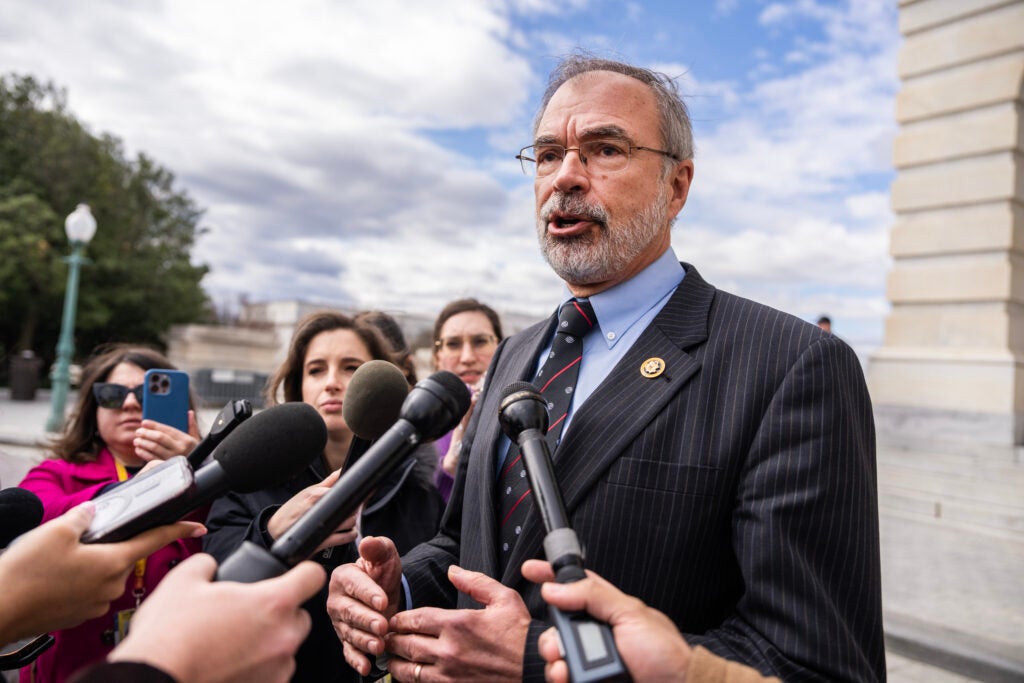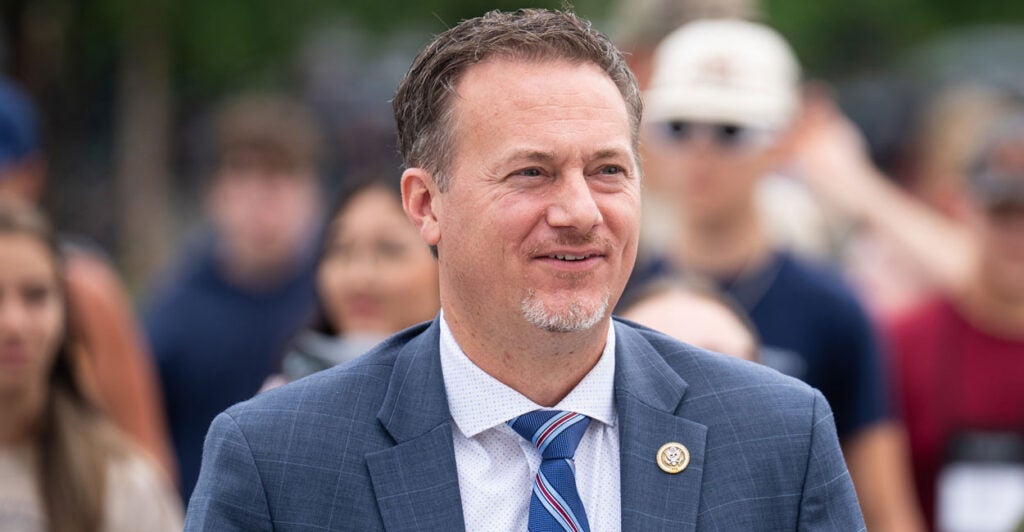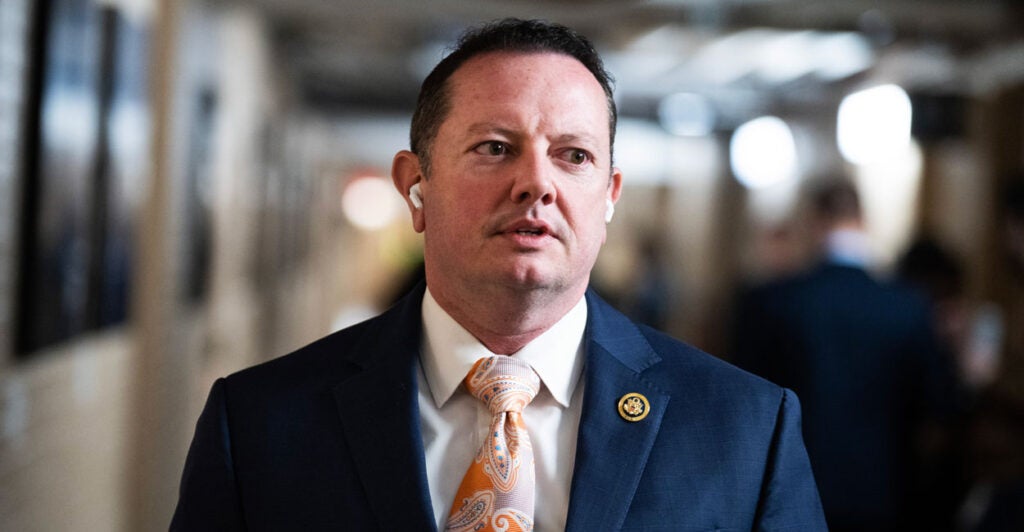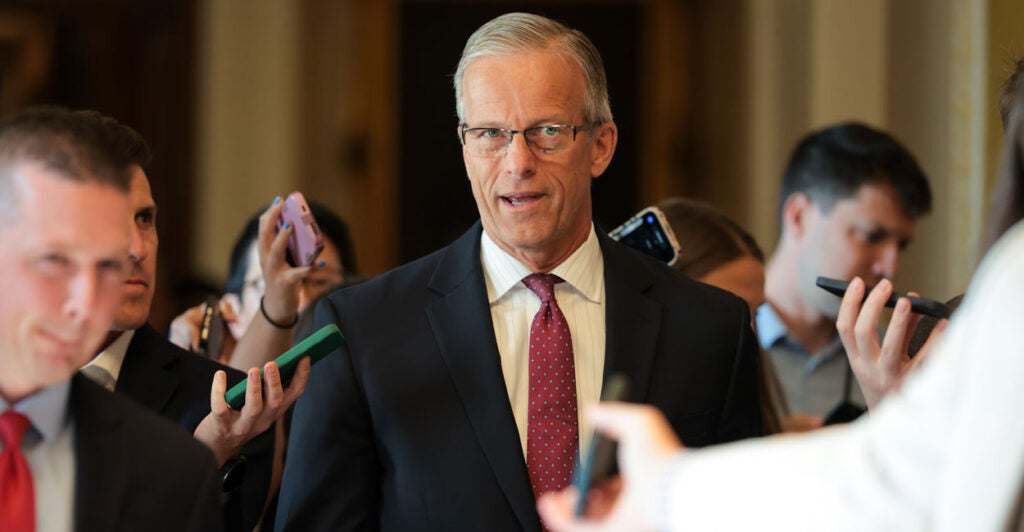As leadership in both houses of Congress hustle to pass the One Big Beautiful Bill Act by Independence Day, fiscal hawks in the House Freedom Caucus are sending a warning—they will not vote for any Senate bill that deepens the deficits from the original House bill.
“We’d certainly be more than happy to pass it within that timeframe, but not if it means that we violate the House budget framework,” House Freedom Caucus Chairman Andy Harris, R-Md., told The Daily Signal. “And the current version of the Senate bill doesn’t come close to adhering to the House budget framework.”
July 4 is the preferred deadline of President Donald Trump, Senate Majority Leader John Thune, R-S.D., and Speaker of the House Mike Johnson, R-La., to pass the ten-year fiscal package, which would deliver on Trump campaign promises, such as extending the 2017 tax cuts and funding border security.
“NO ONE GOES ON VACATION UNTIL IT’S DONE,” wrote Trump on the social media platform Truth Social Tuesday.
Failure to pass this bill, which only squeaked through the House by a one-vote margin in May, would be an absolute disaster for the Republicans’ legislative goals.
Will the Deadline Even Work?
Freedom Caucus members think this deadline could work, but only if the Senate heeds their warnings.
They reckon the Senate’s tentative plans, including increased tax permanence and weaker phase-outs of Biden-era green energy incentives, could add an additional $1 trillion to the overall deficit over ten years.
“We’ve made it very clear if the Senate is going to send over something that blows up the deficit, I’ve made promises to my constituents that I wouldn’t do that,” Rep. Eric Burlison, R-Mo., told The Daily Signal.
Rep. Michael Cloud, R-Texas, similarly told The Daily Signal, “I think it’s achievable, but you know, it’s not only up to us. It’s going to take the Senate taking seriously what was in the House bill.”
He added, “For many of us, the House bill, we had hoped it would improve in the Senate, actually. So, to see so many of the good reforms that seem to be dropping out is concerning at this point.”
Rep. Mark Harris, R-N.C., also said it remains to be seen how long it will take to come to a deal.
“If the text gets written and it’s something [where] we are close to the framework that we had in the House version, then I don’t think there’s a problem,” he said.

“We’re ready to come back, we’re ready to stay here. In fact, Andy Harris told me earlier he’s ready to stay here all the way through August, whatever we need to do to get it done.”
Andy Harris explained to The Daily Signal that the Freedom Caucus actually has a couple of options other than just voting the bill down if it proves unsatisfactory.
“If they want this definitely done by July 4th, they have to work this out before they send it over to the House,” he said.
“Because otherwise, I know there are a group of members who will either insist that the only vote they’ll take is to go to conference on it, or that we will just not approve the rule to bring it to debate.”
He added, “Both of those options actually keep the bill alive because obviously if we voted down the bill, then we’d have to start at ground zero with regards to redoing this reconciliation effort.”
Going to conference would involve a joint session of the House and Senate, in which they would sort out their differences. This would be a last resort option.
“That’s not our goal,” the Freedom Caucus chairman clarified. “Our goal is to actually get a product to the president’s desk by July 4th. But our—and I’ll put it in air quotes—our red line, which has always been the red line, is it has to adhere to the House budget framework.”
But what are the main issues that need to be sorted out if the House Freedom Caucus is to go along with the big, beautiful bill?
Want Tax Cuts? It Will Cost You.
Freedom Caucus members are alarmed by recently proposed changes to the bill in the Senate, where more and more tax cuts are likely to be made permanent without matching spending cuts.
The increased tax permanence would raise projected deficits over the ten-year window.
“It’s not that anybody’s running around here against the tax cuts,” Cloud told The Daily Signal. “The question is how are we going to pay for them.”

Burlison similarly singled this out as a priority.
“I would love to make them permanent,” he told The Daily Signal. “I just think we ought to find the spending cuts. We’re Republicans. We campaigned on cutting spending, not raising spending. This is our moment. We won’t ever have another chance like this.”
Matching tax cuts to the spending cuts has for months been part of a commitment between Johnson and the House Freedom Caucus, but this deal is at stake in the Senate.
Eliminating the ‘Green New Scam’
A major sticking point for these members is how the Senate has undone much of the House’s work to aggressively phase out Biden-era green energy incentives—what the president calls the “green new scam.”
Freedom Caucus members are demanding the Senate back off from preserving these incentives.
Trump “has made it pretty clear on the green new scam that he believes that every dollar of subsidies should go away,” the chairman said.
“I will tell you that if [the Senate] did that, they’d be about halfway to mitigating that $1 trillion increase in the budget deficit.”
In fact, the president wrote in a recent Truth Social post, “I HATE ‘GREEN TAX CREDITS’ IN THE GREAT, BIG, BEAUTIFUL BILL. They are largely a giant SCAM.”

Burlison sees this as a battle between lobbyists and the “Make America Great Again” agenda.
“The president has been very, very clear, repeatedly saying that he wants it all gone. He wants the whole thing gone. And yet … the lobbyists, the power of K street in this town is what’s keeping the Green New Deal alive,” he said.
Speaker Johnson’s Promises
As House members find themselves at the mercy of the Senate, it has brought House leadership and the Freedom Caucus closer together. Freedom Caucus members broadly indicated they believe Johnson is trying to honor past commitments.
“The speaker has promised us that he will not bring a final bill to the floor—he promised this months ago—will not bring a final bill to the floor that does not adhere to the House framework,” Harris said. “And I’m sure he realizes that the current Senate proposal … would add about a trillion dollars to the budget deficit.”

Mark Harris expressed a similar view.
“I think the speaker knows the margins,” he said. “He emphasized that from the beginning. He kept telling the Senate, don’t mess with it … the speaker has been a staunch defender of our proposition and what we’ve tried to do.”
Is the Byrd Rule the Villian?
Beyond Senate changes, such as making tax cuts permanent and weakening the phase-out of environmental policies, Congress is in a quagmire with the Senate’s Byrd rule.
Under the Byrd rule, Senate Parliamentarian Elizabeth MacDonough—essentially the chamber’s rule keeper and referee—decides on whether or not provisions belong in the ten-year budgetary process.
There have been a number of casualties so far, including a block on key cost-saving Medicaid reforms after these interviews were conducted.
But Freedom Caucus members say these rulings are not very important.
“The lion’s share of that trillion dollars is because the Senate decided to make some of the expired business tax policy permanent,” said Andy Harris.
Others suggested the Byrd rule is just a convenient excuse.
“I’ve heard from people that are former Senate staffers that it all has to do with what the leader wants to accomplish,” said Burlison. “That if the leader wants something dead, they will write it in such a way that they know that it will die. But yet if they want something to pass, they’ll figure out a way to write it to get it through Byrd.”

Cloud also said these rulings cannot be blamed if the Senate’s bill falls short of the Freedom Caucus’ goals.
“When we look back two, three generations from now and our kids wonder why [we failed] at doing the fiscal reforms and transformative reforms that need to happen, and the excuse was the Senate parliamentarian, I don’t think that’s a good excuse that would be good enough for our kids,” he said.
“So we’ve got to figure out what it’s going to take to get the reforms that need to happen, the things that we all campaigned on.”








